Tool Rental Market
Tool Rental Market Size and Share Forecast Outlook 2025 to 2035
The tool rental market is projected to grow from USD 12.2 billion in 2025 to USD 18.2 billion by 2035, at a CAGR of 4.1%. Power Tools will dominate with a 40.0% market share, while construction will lead the end user segment with a 45.0% share.
Tool Rental Market Forecast and Outlook (2025-2035)
The global Tool rental market is projected to grow from USD 12,200.0 million in 2025 to USD 18,200.0 million by 2035, recording an absolute increase of USD 230.0 million over the forecast period. This translates into a compound annual growth rate (CAGR) of 4.1%, with the market expected to expand by nearly 1.4X during the same period.
The growth is driven by increasing demand for landscaping services, gardening, and agricultural maintenance, as well as the rising adoption of rental equipment solutions, which allow individuals and businesses to access cost-effective and high-performance Tools without long-term capital investment.
Quick Stats for Tool Rental Market
- Tool Rental Market Value (2025): USD 12,200.0 million
- Tool Rental Market Forecast Value (2035): USD 18,200.0 million
- Tool Rental Market Forecast CAGR: 4.1%
- Leading Type in Tool Rental Market: Power Tools
- Key Growth Regions in Tool Rental Market: Asia Pacific, Europe, and North America
- Top Players in Tool Rental Market: Home Depot, United Rentals, Lowe's, Ashtead, Hilti, HSS Hire, Sunbelt, Boels, Makita, Milwaukee, DeWalt, Bosch, Herc Rentals, Kiloutou, Snap-on
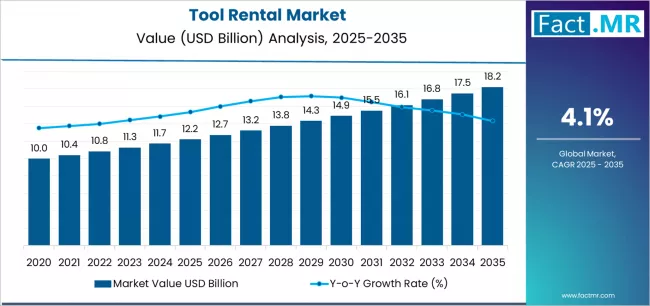
The first half of the decade (2025–2030) is expected to witness steady growth as demand for residential and small-scale commercial landscaping rises. Homeowners, landscaping contractors, and municipal maintenance teams are increasingly relying on rental solutions for seasonal garden preparation, soil tilling, and land cultivation tasks. Rental services offer flexibility in equipment selection, including electric, gasoline-powered, and multi-functional Tools, enabling users to choose machinery that suits specific project requirements. This period will be marked by gradual adoption of mid-range Tools for urban landscaping projects and home gardening applications, supported by growing awareness of the benefits of rental solutions in reducing maintenance responsibilities and upfront costs.
The latter half of the decade (2030–2035) is expected to drive accelerated market growth, with increasing demand from commercial landscaping projects, urban green initiatives, and agricultural service providers. Larger-scale contractors and landscaping companies will adopt high-capacity and advanced Tools on a rental basis to optimize efficiency and productivity for commercial lawns, parks, golf courses, and horticultural farms. The integration of automated and ergonomically designed Tools will enhance ease of operation, reduce labor costs and improving workflow. Additionally, rental companies are likely to expand their service offerings by providing maintenance, delivery, and equipment training, making Tool rentals more attractive to professional and semi-professional users.
Regional trends indicate that North America and Europe will continue to lead the market due to mature rental infrastructure, high disposable income, and increasing focus on landscape aesthetics and urban green projects. Meanwhile, Asia-Pacific is expected to witness strong growth, driven by rising urbanization, commercial landscaping demand, and increasing adoption of rental equipment in emerging economies such as India, China, and Southeast Asian countries. Latin America and the Middle East & Africa are expected to grow steadily, supported by expanding residential developments and landscaping projects.
Challenges such as seasonal demand fluctuations, equipment maintenance costs, and occasional supply limitations may hinder growth, prompting rental companies to invest in efficient fleet management, predictive maintenance, and flexible rental packages to sustain adoption.
Overall, the global Tool rental market is poised for steady and sustained growth through 2035, fueled by landscaping demand, cost-effective rental solutions, and increasing investments in urban and residential greenery projects. Companies focusing on high-performance equipment, flexible rental plans, and after-sales support will be best positioned to capture long-term opportunities in this evolving market.
Tool Rental Market Year-over-Year Forecast (2025-2035)
Between 2025 and 2030, the tool rental market is projected to expand from USD 12,200.0 million to USD 14,800.0 million, resulting in a value increase of USD 2,600.0 million, which represents 43.3% of the total forecast growth for the decade. This phase of development will be shaped by rising demand for construction equipment and DIY project tools, product innovation in power tool technologies and digital rental platforms, as well as expanding integration with construction projects and home improvement applications. Companies are establishing competitive positions through investment in equipment fleet expansion, advanced inventory management systems, and strategic market expansion across construction, DIY, and industrial applications.
From 2030 to 2035, the market is forecast to grow from USD 14,800.0 million to USD 18,200.0 million, adding another USD 3,400.0 million, which constitutes 56.7% of the overall ten-year expansion. This period is expected to be characterized by the expansion of online rental platforms, including advanced digital booking systems and next-generation equipment tracking solutions tailored for specific project requirements, strategic collaborations between tool rental companies and construction firms, and an enhanced focus on equipment quality standards and automated inventory management protocols. The growing emphasis on cost optimization and project efficiency will drive demand for comprehensive tool rental solutions across diverse industrial applications.
Tool Rental Market Key Takeaways
| Metric | Value |
|---|---|
| Market Value (2025) | USD 12,200.0 million |
| Market Forecast Value (2035) | USD 18,200.0 million |
| Forecast CAGR (2025-2035) | 4.1% |
Why is the Tool Rental Market Growing?
The tool rental market grows by enabling construction companies and DIY enthusiasts to optimize project costs while accessing specialized equipment without substantial capital investment. Construction companies and industrial operators face mounting pressure to develop cost-effective project solutions and flexible equipment access while managing complex budget requirements, with tool rental typically providing 40-60% cost savings compared to equipment purchase alternatives, making rental services essential for competitive project positioning. The construction industry's need for diverse equipment and project-specific capabilities creates demand for comprehensive tool rental solutions that can provide superior flexibility, maintain high-quality equipment standards, and ensure reliable operation without compromising project timelines or operational effectiveness.
Government initiatives promoting infrastructure development and construction modernization drive adoption in residential development, commercial construction, and industrial applications, where equipment availability has a direct impact on project performance and completion timelines. However, equipment maintenance complexity during large-scale construction projects and the logistics requirements for timely equipment delivery may limit accessibility among smaller contractors and remote regions with limited rental infrastructure for specialized equipment systems.
Segmental Analysis
The market is segmented by type, end user, channel, and region. By type, the market is divided into power tools, hand tools, and garden tools. Based on end user, the market is categorized into construction, DIY, and industrial. By channel, the market includes retail and online. Regionally, the market is divided into Asia Pacific, Europe, North America, and other key regions.
By Type, the Power Tools Segment Accounts for a Dominant Market Share
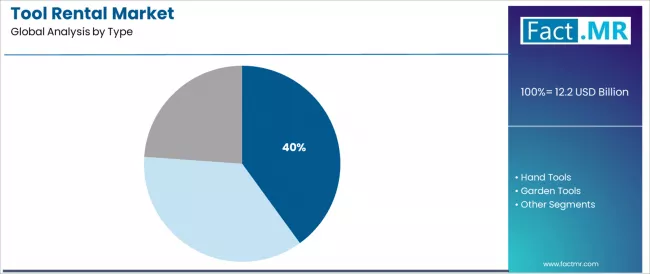
The power tools segment represents the dominant force in the tool rental market, capturing approximately 40.0% of total market share in 2025. This established type category encompasses solutions featuring advanced electrical equipment and mechanized tool applications, including high-performance construction capabilities and enhanced project efficiency characteristics that enable superior operational benefits and completion outcomes across all construction applications. The power tools segment's market leadership stems from its proven performance capabilities, with solutions capable of addressing diverse construction requirements while maintaining consistent quality standards and operational effectiveness across all project environments.
The hand tools segment maintains a substantial 30.0% market share, serving construction and DIY applications that require manual equipment with enhanced precision properties for large-scale construction projects and home improvement activities. These solutions offer advanced durability capabilities for complex project requirements while providing sufficient reliability characteristics to meet construction and industrial regulatory demands. The garden tools segment accounts for approximately 30.0% of the market, serving outdoor maintenance applications requiring specific landscaping properties or specialized equipment configurations.
Key type advantages driving the power tools segment include:
- Advanced electrical technology with integrated automation properties that enhances operational effectiveness and ensures consistent performance characteristics
- Established rental processes allowing streamlined project workflows across different applications without extensive training requirements
- Enhanced efficiency capabilities enabling diverse construction formats while maintaining equipment reliability and performance consistency
- Superior market acceptance providing optimal project performance for various construction applications
By End User, the Construction Segment Accounts for the Largest Market Share
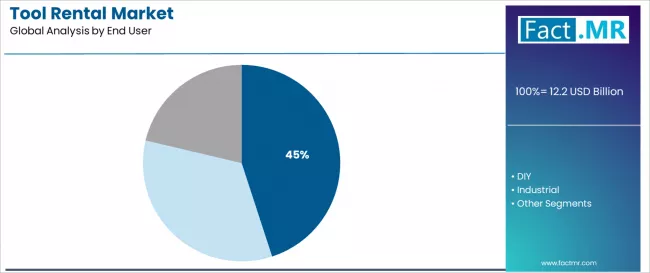
Construction applications dominate the tool rental market with approximately 45.0% market share in 2025, reflecting the critical role of equipment rental in supporting construction project requirements and operational performance worldwide. The construction segment's market leadership is reinforced by increasing infrastructure trends, project complexity requirements, and rising needs for specialized equipment capabilities in construction applications across developed and emerging markets.
The DIY segment represents the second-largest end user category, capturing 35.0% market share through specialized requirements for home improvement projects, personal construction activities, and residential maintenance applications. This segment benefits from growing DIY integration demand that requires specific equipment access, cost optimization standards, and performance enhancement protocols in consumer markets.
The industrial segment accounts for 20.0% market share, serving manufacturing facilities, maintenance operations, and specialized industrial applications across various commercial sectors.
Key market dynamics supporting end user growth include:
- Construction expansion driven by infrastructure development and project optimization, requiring specialized equipment solutions in emerging construction markets
- DIY modernization trends require flexible, accessible rental systems for competitive cost management and project completion development
- Integration of digital rental technologies enabling enhanced booking capabilities and automated equipment tracking systems
- Growing emphasis on cost efficiency driving demand for specialized, validated equipment solutions without traditional ownership limitations
What are the Drivers, Restraints, and Key Trends of the Tool Rental Market?
The market is driven by three concrete demand factors tied to construction and project outcomes. First, cost optimization and equipment access solutions create increasing demand for tool rental systems, with cost savings of 15-25% annually in major construction applications worldwide, requiring comprehensive rental infrastructure. Second, government initiatives promoting infrastructure development and construction innovation drive increased adoption of rental equipment services, with many countries implementing construction development programs and regulatory frameworks for project efficiency by 2030. Third, technological advancements in equipment tracking and digital booking platforms enable more efficient and effective rental solutions that improve project performance while reducing operational costs and logistical complexity.
Market restraints include complex equipment maintenance requirements and insurance costs for rental platforms that can challenge market participants in developing compliant service capabilities, particularly in regions where regulatory pathways for rental equipment remain evolving and uncertain. Technical complexity of equipment management systems and inventory tracking requirements pose another significant challenge, as tool rental demands sophisticated logistics methods and quality controls, potentially affecting operational costs and service efficiency. Equipment availability constraints from high demand periods across different regions create additional operational challenges for rental companies, demanding ongoing investment in fleet expansion and inventory assurance programs.
Key trends indicate accelerated adoption in Asia-Pacific markets, particularly India and China, where construction expansion and infrastructure modernization drive comprehensive tool rental adoption. Technology integration trends toward digital rental platforms with enhanced booking characteristics, advanced equipment tracking applications, and integrated inventory solutions enable effective rental approaches that optimize operational efficiency and minimize equipment risks. However, the market thesis could face disruption if significant advances in equipment purchase financing or major changes in construction technologies reduce reliance on traditional rental applications.
Analysis of the Tool Rental Market by Key Country
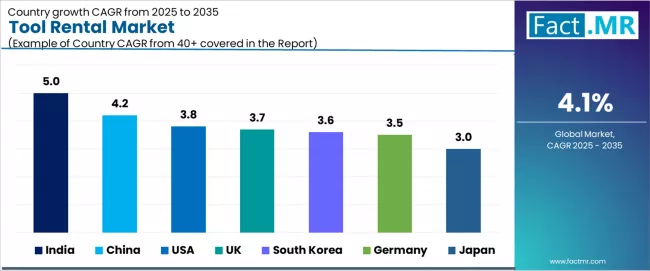
| Country | CAGR (%) |
|---|---|
| India | 5.0% |
| China | 4.2% |
| USA | 3.8% |
| UK | 3.7% |
| South Korea | 3.6% |
| Germany | 3.5% |
| Japan | 3.0% |
The global tool rental market is expanding steadily, with India leading at a 5.0% CAGR through 2035, driven by construction growth, government infrastructure initiatives, and expanding DIY platforms. China follows at 4.2%, supported by construction modernization, large-scale infrastructure programs, and industrial development initiatives. USA records 3.8%, reflecting an established landscape with growing integration in construction and DIY markets. UK grows at 3.7%, anchored by construction activities and strong rental networks. South Korea advances at 3.6%, leveraging construction development and equipment modernization. Germany posts 3.5%, focusing on industrial applications, while Japan grows steadily at 3.0%, emphasizing equipment precision and operational excellence.
India Leads Global Market Expansion
India demonstrates the strongest growth potential in the tool rental market with a CAGR of 5.0% through 2035. The country's leadership position stems from construction sector expansion, government-backed infrastructure initiatives, and comprehensive construction regulations driving the adoption of advanced tool rental solutions. Growth is concentrated in major construction and infrastructure centers, including Mumbai, Delhi, Bangalore, and Chennai, where construction companies and contractors are implementing advanced rental systems for enhanced project capabilities and cost optimization. Distribution channels through equipment suppliers and rental providers expand deployment across construction projects and infrastructure development initiatives. The country's Ministry of Housing and Urban Affairs provides policy support for construction technology modernization, including comprehensive equipment rental capability development.
Key market factors:
- Construction sector expansion concentrated in urban centers and infrastructure districts with comprehensive development programs
- Government support through infrastructure initiatives and construction modernization incentives
- Comprehensive equipment rental ecosystem, including established suppliers with proven capabilities
- Technology integration featuring advanced booking platforms, inventory systems, and project optimization technologies
China Emerges as High-Growth Market
In major construction and industrial centers including Beijing, Shanghai, Shenzhen, and Guangzhou, the adoption of comprehensive tool rental solutions is accelerating across infrastructure projects and construction development initiatives, driven by construction scaling and government infrastructure programs. The market demonstrates strong growth momentum with a CAGR of 4.2% through 2035, linked to comprehensive construction modernization and increasing focus on cost optimization solutions. Chinese companies are implementing advanced rental systems and booking platforms to enhance project performance while meeting growing demand in expanding construction and manufacturing sectors. The country's infrastructure development initiatives create continued demand for rental equipment, while increasing emphasis on efficiency drives adoption of advanced inventory systems.
Key development areas:
- Construction facilities and infrastructure centers leading rental adoption with comprehensive project programs
- Equipment services channels providing integrated solutions with 90% availability compliance rates
- Technology partnerships between rental companies and construction enterprises are expanding market reach
- Integration of advanced booking platforms and comprehensive inventory management systems
USA Shows Market Maturity Leadership
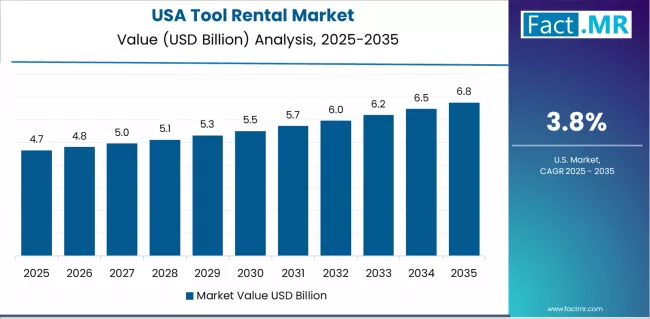
USA's market expansion is driven by diverse construction demand, including residential development in major cities and comprehensive infrastructure projects across multiple regions. The country demonstrates strong growth potential with a CAGR of 3.8% through 2035, supported by federal infrastructure programs and industry-level construction development initiatives. American companies face implementation challenges related to equipment logistics and scaling requirements, requiring strategic development approaches and support from specialized rental partners. However, growing construction demands and project optimization requirements create compelling business cases for rental adoption, particularly in construction areas where equipment access has a direct impact on operational success and competitive positioning.
Market characteristics:
- Construction and infrastructure segments showing robust growth with 20% annual increase in rental utilization
- Regional expansion trends focused on construction areas in major metropolitan and infrastructure regions
- Future projections indicate the need for advanced logistics infrastructure and equipment specialist training programs
- Growing emphasis on cost optimization and operational competitiveness in construction operations
Germany Demonstrates Equipment Excellence
The Germany market leads in advanced equipment innovation based on integration with construction systems and precision rental technologies for enhanced project performance. The country shows strong potential with a CAGR of 3.5% through 2035, driven by the modernization of existing construction infrastructure and the expansion of advanced rental facilities in major industrial areas, including Bavaria, Baden-Württemberg, North Rhine-Westphalia, and Lower Saxony. German companies are adopting intelligent rental systems for cost improvement and efficiency enhancement, particularly in regions with advanced construction requirements and industrial applications demanding comprehensive technology upgrades. Technology deployment channels through established industrial institutions and construction operators expand coverage across project facilities and efficiency-focused applications.
Leading market segments:
- Construction modernization projects in major industrial centers are implementing comprehensive rental upgrades
- Industrial partnerships with equipment providers, achieving 95% project efficiency improvement rates
- Strategic collaborations between rental companies and construction operations are expanding market presence
- Focus on precision equipment systems and specialized industrial requirements
South Korea Emphasizes Technology Integration
In Seoul, Daejeon, Busan, and other major cities, construction facilities are implementing comprehensive tool rental solutions to modernize existing project infrastructure and improve operational capabilities, with documented case studies showing a 50% improvement in project timelines through advanced rental integration. The market shows strong growth potential with a CAGR of 3.6% through 2035, linked to the ongoing modernization of construction facilities, infrastructure networks, and emerging industrial projects in major regions. Korean companies are adopting intelligent rental and booking platforms to enhance construction reliability while maintaining standards demanded by the construction and industrial sectors. The country's established technology infrastructure creates continued demand for rental development and modernization solutions that integrate with existing construction systems.
Market development factors:
- Construction facilities and infrastructure networks leading rental initiatives across South Korea
- Technology programs providing government funding support for construction and industrial infrastructure upgrades
- Strategic partnerships between Korean construction companies and international rental providers are expanding technical capabilities
- Emphasis on operational excellence and equipment applications across construction projects
Japan Shows Equipment Technology Leadership
Japan's tool rental market demonstrates advanced implementation focused on equipment precision and operational performance optimization, with documented integration of specialized rental systems, achieving 40% improvement in project efficiency across construction and industrial facilities. The country maintains steady growth momentum with a CAGR of 3.0% through 2035, driven by construction facilities' emphasis on quality excellence and continuous operational methodologies that align with Japanese industrial standards applied to rental operations. Major industrial areas, including Kanto, Kansai, Chubu, and Kyushu, showcase advanced deployment of rental platforms where equipment systems integrate seamlessly with existing construction infrastructure and comprehensive quality management programs.
Key market characteristics:
- Construction facilities and industrial centers are driving advanced rental requirements with emphasis on quality and performance optimization
- Quality partnerships enabling 98% operational compliance with comprehensive equipment programs
- Industrial collaboration between Japanese companies and international rental providers is expanding market capabilities
- Emphasis on quality requirements and continuous operational methodologies
UK Emphasizes Construction Development
UK's tool rental market demonstrates established and growth-focused landscape, characterized by growing integration of rental operations with existing construction infrastructure across project sites, equipment networks, and modernization initiatives. UK's emphasis on construction excellence and operational innovation drives demand for advanced rental solutions that support comprehensive infrastructure initiatives and project requirements in construction operations. The market benefits from partnerships between international rental providers and domestic construction leaders, creating service ecosystems that prioritize equipment excellence and quality programs. Construction centers in major regions showcase developing rental implementations where equipment systems achieve efficiency improvements through integrated project programs.
Europe Market Split by Country
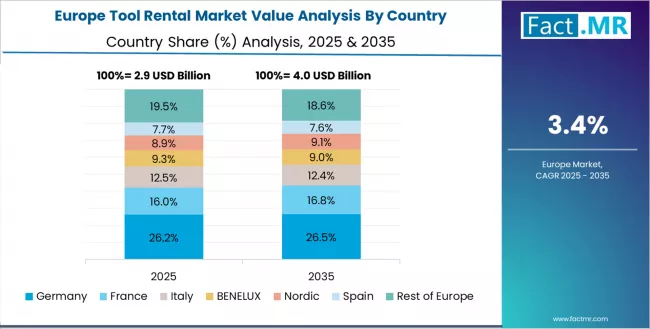
The tool rental market in Europe is projected to grow from USD 12,200.0 million in 2025 to USD 18,200.0 million by 2035, registering a CAGR of 4.1% over the forecast period. Germany is expected to maintain its leadership position with a market value of USD 2,600.0 million in 2025, supported by its extensive construction infrastructure, advanced equipment rental facilities, and comprehensive industrial networks serving major European markets.
United Kingdom follows with a market value of USD 1,900.0 million in 2025, driven by comprehensive construction programs in major development regions implementing advanced rental systems. France holds USD 1,600.0 million in 2025 through the ongoing development of infrastructure facilities and construction networks. Italy commands USD 1,200.0 million, while Spain accounts for USD 1,000.0 million in 2025. The Rest of Europe region holds USD 3,900.0 million, attributed to increasing rental adoption in Nordic countries and emerging Eastern European construction facilities implementing infrastructure programs.
Equipment Technology Dominates Construction Demand in Japan
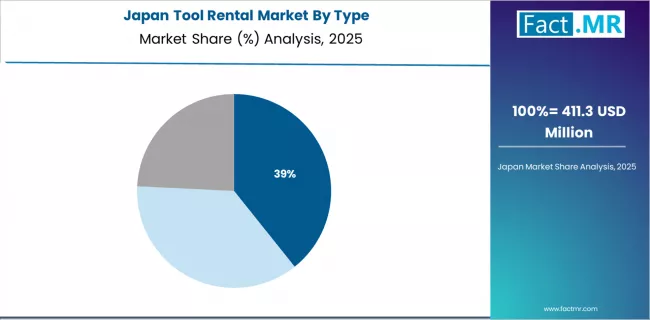
The Japanese tool rental market demonstrates a mature and quality-focused landscape, characterized by advanced integration of equipment technology with existing construction infrastructure across project facilities, rental networks, and industrial initiatives. Japan's emphasis on quality excellence and precision construction drives demand for high-reliability rental solutions that support comprehensive infrastructure initiatives and regulatory requirements in construction operations. The market benefits from strong partnerships between international rental providers and domestic construction leaders, creating comprehensive service ecosystems that prioritize equipment quality and technical precision programs. Construction centers in major industrial regions showcase advanced rental implementations where equipment systems achieve quality improvements through integrated monitoring programs.
In Japan, the market demonstrates distinct segmentation by type, with power tools accounting for 45.0% market share, reflecting the country's emphasis on advanced construction technology and automated equipment solutions. Hand tools maintain 30.0% market share, serving precision construction applications that require manual equipment with enhanced accuracy properties for specialized construction and manufacturing projects. Garden tools represent 25.0% of the market, supporting landscape maintenance and outdoor construction applications across residential and commercial sectors.
Technology Providers Lead Rental Services in South Korea
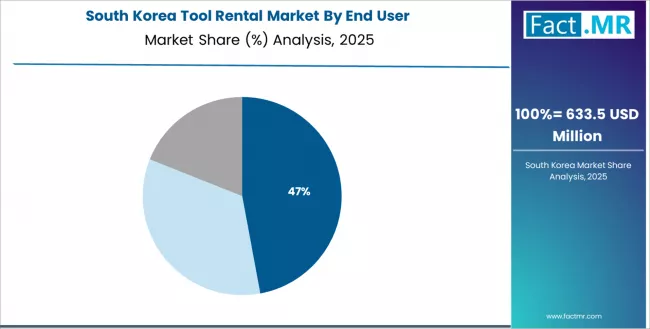
The South Korean tool rental market is characterized by strong domestic and international provider presence, with companies maintaining competitive positions through comprehensive system integration and technical services capabilities for construction and industrial applications. The market is demonstrating a growing emphasis on localized technical support and rapid deployment capabilities, as Korean companies increasingly demand customized solutions that integrate with domestic construction infrastructure and advanced equipment systems deployed across major technology centers and industrial facilities.
The market shows distinct patterns in end user segmentation, with construction applications dominating at 50.0% market share, reflecting the country's ongoing infrastructure development and construction modernization initiatives. DIY applications account for 35.0% of the market, driven by growing home improvement trends and residential construction activities. Industrial applications represent 15.0% market share, serving manufacturing facilities and specialized industrial projects requiring advanced equipment solutions.
Competitive Landscape of the Tool Rental Market
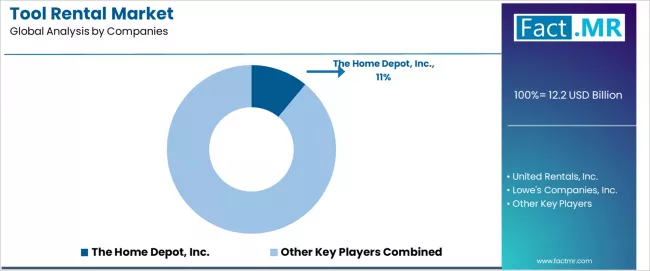
The tool rental market features approximately 20-25 meaningful players with moderate concentration, where the top three companies control roughly 25-35% of global market share through established equipment portfolios and extensive rental relationships. Competition centers on equipment availability, service quality, and operational expertise rather than price competition alone.
Market leaders include Home Depot, United Rentals, and Lowe's, which maintain competitive advantages through comprehensive rental portfolios, advanced equipment capabilities, and deep expertise in the construction and DIY sectors, creating high switching costs for customers. These companies leverage established construction relationships and ongoing development partnerships to defend market positions while expanding into adjacent industrial and residential applications.
Challengers encompass Ashtead and Hilti, which compete through specialized equipment technologies and strong regional presence in key construction markets. Equipment specialists, including HSS Hire, Sunbelt, and Boels, focus on specific tool categories or vertical applications, offering differentiated capabilities in construction systems, industrial applications, and application-specific equipment.
Regional players and emerging rental companies create competitive pressure through innovative service approaches and rapid deployment capabilities, particularly in high-growth markets including India and China, where local presence provides advantages in cost optimization and regulatory compliance. Market dynamics favor companies that combine advanced equipment technologies with comprehensive rental services that address the complete project lifecycle from equipment delivery through ongoing performance assurance and technical support.
Global Tool Rental Market - Stakeholder Contribution Framework
Tool rental solutions represent a critical operational resource that enables construction companies, contractors, and DIY enthusiasts to enhance project efficiency and cost optimization without substantial capital investment, typically providing 40-60% cost savings compared to equipment purchase alternatives while ensuring unprecedented flexibility and operational compliance. With the market projected to grow from USD 12,200.0 million in 2025 to USD 18,200.0 million by 2035 at a 4.1% CAGR, these solutions offer compelling advantages - superior cost efficiency, enhanced project flexibility, and equipment capabilities - making them essential for construction applications (45.0% market share), DIY operations (35.0% share), and diverse industrial applications seeking reliable rental solutions. Scaling market penetration and service capabilities requires coordinated action across construction policy, equipment standards, rental providers, construction companies, and industrial institutions.
How Governments Could Spur Local Development and Adoption?
- Infrastructure Development Programs: Include tool rental capabilities in national construction development initiatives, providing targeted funding for equipment rental facilities in construction regions and supporting local contractors through innovation grants and development support.
- Tax Policy & R&D Support: Implement accelerated depreciation schedules for rental equipment, provide tax incentives for companies investing in advanced rental fleet and inventory technologies, and establish favorable accounting standards that encourage rental adoption over equipment purchase approaches.
- Regulatory Framework Development: Create streamlined approval processes for equipment rental across construction and industrial applications, establish clear safety quality frameworks for rental equipment, and develop international harmonization protocols that facilitate cross-border construction projects.
- Skills Development & Training: Fund vocational programs for equipment technicians, rental specialists, and construction professionals. Invest in technology transfer initiatives that bridge construction innovation with commercial rental development and safety optimization systems.
- Market Access & Competition: Establish procurement policies that favor equipment rental solutions for government construction applications, support infrastructure development through rental modernization programs, and create regulatory environments that encourage innovation in equipment technologies.
How Industry Bodies Could Support Market Development?
- Equipment Standards & Certification: Define standardized safety metrics for rental equipment across construction, industrial, and DIY applications, establish universal quality and performance protocols, and create certification programs for equipment performance that companies can rely on.
- Market Education & Best Practices: Lead messaging that demonstrates rental advantages, emphasizing improved project performance, enhanced cost optimization, and superior operational flexibility compared to conventional equipment purchase alternatives.
- Technology Integration Standards: Develop interoperability standards for rental systems, construction compatibility guidelines, and booking platforms, ensuring seamless integration across different project environments and regulatory requirements.
- Professional Development: Run certification programs for rental specialists, equipment technicians, and service teams on optimizing equipment performance, safety compliance, and construction applications in competitive project markets.
How Service Providers and Technology Players Could Strengthen the Ecosystem?
- Advanced Equipment Development: Develop next-generation rental platforms with enhanced equipment capabilities, improved automated features, and application-specific characteristics that enhance project reliability while reducing operational complexity.
- Intelligence Platforms: Provide comprehensive booking software that integrates inventory monitoring, equipment tracking, predictive analytics, and project optimization, enabling companies to maximize rental efficiency and cost effectiveness.
- Service & Support Networks: Offer flexible support programs for construction companies and contractors, including technical training options, equipment consultation services, and operational optimization pathways that keep rental systems current with project demands.
- Research & Development Networks: Build comprehensive R&D capabilities, collaborative equipment innovation programs, and application development systems that ensure rental technologies maintain high quality standards and consistent performance across diverse construction environments.
How Suppliers Could Navigate the Shift?
- Diversified Equipment Portfolios: Expand rental offerings across construction applications (45.0% end user dominance), DIY operations (35.0% share), and industrial applications, with particular focus on power tools services (40.0% type dominance) and specialized solutions for construction requirements.
- Geographic Market Development: Establish operations in high-growth markets like India (5.0% CAGR) and China (4.2% CAGR), while strengthening presence in established markets like USA (3.8% CAGR) and Germany (3.5% CAGR) through regional service capabilities and local partnerships.
- Technology-Enabled Services: Implement advanced tracking systems with real-time inventory monitoring, automated booking optimization, and predictive equipment capabilities that differentiate service offerings and improve customer satisfaction and retention.
- Flexible Service Models: Develop standard, premium, and custom rental solutions that accommodate varying construction needs, from cost-effective equipment access to high-performance applications for demanding construction and regulatory requirements.
How Investors and Financial Enablers Could Unlock Value?
- Equipment Fleet Expansion Financing: Provide growth capital for established companies like Home Depot, United Rentals, and Lowe's to expand rental capacity and development capabilities, particularly in emerging markets with growing construction demands.
- Innovation Investment: Back startups developing advanced booking systems, next-generation equipment tracking, and intelligent rental technologies that enhance construction industry efficiency and competitive positioning.
- Regional Market Development: Finance market entry and expansion strategies for rental companies establishing operations in high-growth regions, supporting localization initiatives that reduce operational costs while maintaining service standards.
- Consolidation & Scale Opportunities: Support strategic acquisitions and market consolidation that create economies of scale, improve equipment capabilities, and enhance competitive positioning against fragmented regional providers across multiple geographic markets.
Key Players in the Tool Rental Market
- The Home Depot, Inc.
- United Rentals, Inc.
- Lowe's Companies, Inc.
- Ashtead Group plc
- Hilti Corporation
- HSS Hire Service Group Ltd.
- Sunbelt Rentals, Inc.
- Boels Rental B.V.
- Makita Corporation
- Milwaukee Tool (Techtronic Industries Company Limited)
- DeWalt (Stanley Black & Decker, Inc.)
- Bosch Power Tools (Robert Bosch GmbH)
- Herc Rentals, Inc.
- Kiloutou
- Snap-on Incorporated
Scope of the Report
| Items | Values |
|---|---|
| Quantitative Units (2025) | USD 12,200.0 Million |
| Type | Power Tools, Hand Tools, Garden Tools |
| End User | Construction, DIY, Industrial |
| Channel | Retail, Online |
| Regions Covered | Asia Pacific, Europe, North America, Latin America, Middle East & Africa |
| Countries Covered | India, China, USA, Germany, South Korea, Japan, UK, and 40+ countries |
| Key Companies Profiled | Home Depot, United Rentals, Lowe's, Ashtead, Hilti, HSS Hire, Sunbelt, Boels, Makita, Milwaukee, DeWalt, Bosch, Herc Rentals, Kiloutou, Snap-on |
| Additional Attributes | Dollar sales by type and end user categories, regional adoption trends across Asia Pacific, Europe, and North America, competitive landscape with rental providers and construction companies, equipment facility requirements and specifications, integration with construction initiatives and industrial platforms, innovations in rental technology and inventory systems, and development of specialized applications with quality equipment and operational optimization capabilities. |
Tool Rental Market by Segments
-
Type :
- Power Tools
- Hand Tools
- Garden Tools
-
End User :
- Construction
- DIY
- Industrial
-
Channel :
- Retail
- Online
-
Region :
- Asia Pacific
- China
- Japan
- South Korea
- India
- Australia & New Zealand
- ASEAN
- Rest of Asia Pacific
- Europe
- Germany
- United Kingdom
- France
- Italy
- Spain
- Nordic
- BENELUX
- Rest of Europe
- North America
- United States
- Canada
- Mexico
- Latin America
- Brazil
- Chile
- Rest of Latin America
- Middle East & Africa
- Kingdom of Saudi Arabia
- Other GCC Countries
- Turkey
- South Africa
- Other African Union
- Rest of Middle East & Africa
- Asia Pacific
Table of Content
- Executive Summary
- Global Market Outlook
- Demand to side Trends
- Supply to side Trends
- Technology Roadmap Analysis
- Analysis and Recommendations
- Market Overview
- Market Coverage / Taxonomy
- Market Definition / Scope / Limitations
- Market Background
- Market Dynamics
- Drivers
- Restraints
- Opportunity
- Trends
- Scenario Forecast
- Demand in Optimistic Scenario
- Demand in Likely Scenario
- Demand in Conservative Scenario
- Opportunity Map Analysis
- Product Life Cycle Analysis
- Supply Chain Analysis
- Investment Feasibility Matrix
- Value Chain Analysis
- PESTLE and Porter’s Analysis
- Regulatory Landscape
- Regional Parent Market Outlook
- Production and Consumption Statistics
- Import and Export Statistics
- Market Dynamics
- Global Market Analysis 2020 to 2024 and Forecast, 2025 to 2035
- Historical Market Size Value (USD Million) Analysis, 2020 to 2024
- Current and Future Market Size Value (USD Million) Projections, 2025 to 2035
- Y to o to Y Growth Trend Analysis
- Absolute $ Opportunity Analysis
- Global Market Pricing Analysis 2020 to 2024 and Forecast 2025 to 2035
- Global Market Analysis 2020 to 2024 and Forecast 2025 to 2035, By Type
- Introduction / Key Findings
- Historical Market Size Value (USD Million) Analysis By Type , 2020 to 2024
- Current and Future Market Size Value (USD Million) Analysis and Forecast By Type , 2025 to 2035
- Power Tools
- Hand Tools
- Garden Tools
- Y to o to Y Growth Trend Analysis By Type , 2020 to 2024
- Absolute $ Opportunity Analysis By Type , 2025 to 2035
- Global Market Analysis 2020 to 2024 and Forecast 2025 to 2035, By End User
- Introduction / Key Findings
- Historical Market Size Value (USD Million) Analysis By End User, 2020 to 2024
- Current and Future Market Size Value (USD Million) Analysis and Forecast By End User, 2025 to 2035
- Construction
- DIY
- Industrial
- Y to o to Y Growth Trend Analysis By End User, 2020 to 2024
- Absolute $ Opportunity Analysis By End User, 2025 to 2035
- Global Market Analysis 2020 to 2024 and Forecast 2025 to 2035, By Region
- Introduction
- Historical Market Size Value (USD Million) Analysis By Region, 2020 to 2024
- Current Market Size Value (USD Million) Analysis and Forecast By Region, 2025 to 2035
- North America
- Latin America
- Western Europe
- Eastern Europe
- East Asia
- South Asia and Pacific
- Middle East & Africa
- Market Attractiveness Analysis By Region
- North America Market Analysis 2020 to 2024 and Forecast 2025 to 2035, By Country
- Historical Market Size Value (USD Million) Trend Analysis By Market Taxonomy, 2020 to 2024
- Market Size Value (USD Million) Forecast By Market Taxonomy, 2025 to 2035
- By Country
- USA
- Canada
- Mexico
- By Type
- By End User
- By Country
- Market Attractiveness Analysis
- By Country
- By Type
- By End User
- Key Takeaways
- Latin America Market Analysis 2020 to 2024 and Forecast 2025 to 2035, By Country
- Historical Market Size Value (USD Million) Trend Analysis By Market Taxonomy, 2020 to 2024
- Market Size Value (USD Million) Forecast By Market Taxonomy, 2025 to 2035
- By Country
- Brazil
- Chile
- Rest of Latin America
- By Type
- By End User
- By Country
- Market Attractiveness Analysis
- By Country
- By Type
- By End User
- Key Takeaways
- Western Europe Market Analysis 2020 to 2024 and Forecast 2025 to 2035, By Country
- Historical Market Size Value (USD Million) Trend Analysis By Market Taxonomy, 2020 to 2024
- Market Size Value (USD Million) Forecast By Market Taxonomy, 2025 to 2035
- By Country
- Germany
- UK
- Italy
- Spain
- France
- Nordic
- BENELUX
- Rest of Western Europe
- By Type
- By End User
- By Country
- Market Attractiveness Analysis
- By Country
- By Type
- By End User
- Key Takeaways
- Eastern Europe Market Analysis 2020 to 2024 and Forecast 2025 to 2035, By Country
- Historical Market Size Value (USD Million) Trend Analysis By Market Taxonomy, 2020 to 2024
- Market Size Value (USD Million) Forecast By Market Taxonomy, 2025 to 2035
- By Country
- Russia
- Poland
- Hungary
- Balkan & Baltic
- Rest of Eastern Europe
- By Type
- By End User
- By Country
- Market Attractiveness Analysis
- By Country
- By Type
- By End User
- Key Takeaways
- East Asia Market Analysis 2020 to 2024 and Forecast 2025 to 2035, By Country
- Historical Market Size Value (USD Million) Trend Analysis By Market Taxonomy, 2020 to 2024
- Market Size Value (USD Million) Forecast By Market Taxonomy, 2025 to 2035
- By Country
- China
- Japan
- South Korea
- By Type
- By End User
- By Country
- Market Attractiveness Analysis
- By Country
- By Type
- By End User
- Key Takeaways
- South Asia and Pacific Market Analysis 2020 to 2024 and Forecast 2025 to 2035, By Country
- Historical Market Size Value (USD Million) Trend Analysis By Market Taxonomy, 2020 to 2024
- Market Size Value (USD Million) Forecast By Market Taxonomy, 2025 to 2035
- By Country
- India
- ASEAN
- Australia & New Zealand
- Rest of South Asia and Pacific
- By Type
- By End User
- By Country
- Market Attractiveness Analysis
- By Country
- By Type
- By End User
- Key Takeaways
- Middle East & Africa Market Analysis 2020 to 2024 and Forecast 2025 to 2035, By Country
- Historical Market Size Value (USD Million) Trend Analysis By Market Taxonomy, 2020 to 2024
- Market Size Value (USD Million) Forecast By Market Taxonomy, 2025 to 2035
- By Country
- Kingdom of Saudi Arabia
- Other GCC Countries
- Turkiye
- South Africa
- Other African Union
- Rest of Middle East & Africa
- By Type
- By End User
- By Country
- Market Attractiveness Analysis
- By Country
- By Type
- By End User
- Key Takeaways
- Key Countries Market Analysis
- USA
- Pricing Analysis
- Market Share Analysis, 2024
- By Type
- By End User
- Canada
- Pricing Analysis
- Market Share Analysis, 2024
- By Type
- By End User
- Mexico
- Pricing Analysis
- Market Share Analysis, 2024
- By Type
- By End User
- Brazil
- Pricing Analysis
- Market Share Analysis, 2024
- By Type
- By End User
- Chile
- Pricing Analysis
- Market Share Analysis, 2024
- By Type
- By End User
- Germany
- Pricing Analysis
- Market Share Analysis, 2024
- By Type
- By End User
- UK
- Pricing Analysis
- Market Share Analysis, 2024
- By Type
- By End User
- Italy
- Pricing Analysis
- Market Share Analysis, 2024
- By Type
- By End User
- Spain
- Pricing Analysis
- Market Share Analysis, 2024
- By Type
- By End User
- France
- Pricing Analysis
- Market Share Analysis, 2024
- By Type
- By End User
- India
- Pricing Analysis
- Market Share Analysis, 2024
- By Type
- By End User
- ASEAN
- Pricing Analysis
- Market Share Analysis, 2024
- By Type
- By End User
- Australia & New Zealand
- Pricing Analysis
- Market Share Analysis, 2024
- By Type
- By End User
- China
- Pricing Analysis
- Market Share Analysis, 2024
- By Type
- By End User
- Japan
- Pricing Analysis
- Market Share Analysis, 2024
- By Type
- By End User
- South Korea
- Pricing Analysis
- Market Share Analysis, 2024
- By Type
- By End User
- Russia
- Pricing Analysis
- Market Share Analysis, 2024
- By Type
- By End User
- Poland
- Pricing Analysis
- Market Share Analysis, 2024
- By Type
- By End User
- Hungary
- Pricing Analysis
- Market Share Analysis, 2024
- By Type
- By End User
- Kingdom of Saudi Arabia
- Pricing Analysis
- Market Share Analysis, 2024
- By Type
- By End User
- Turkiye
- Pricing Analysis
- Market Share Analysis, 2024
- By Type
- By End User
- South Africa
- Pricing Analysis
- Market Share Analysis, 2024
- By Type
- By End User
- USA
- Market Structure Analysis
- Competition Dashboard
- Competition Benchmarking
- Market Share Analysis of Top Players
- By Regional
- By Type
- By End User
- Competition Analysis
- Competition Deep Dive
- The Home Depot, Inc.
- Overview
- Product Portfolio
- Profitability by Market Segments (Product/Age /Sales Channel/Region)
- Sales Footprint
- Strategy Overview
- Marketing Strategy
- Product Strategy
- Channel Strategy
- Value (USD Million)ed Rentals, Inc.
- Lowe's Companies, Inc.
- Ashtead Group plc
- Hilti Corporation
- HSS Hire Service Group Ltd.
- Sunbelt Rentals, Inc.
- Boels Rental B.V.
- Makita Corporation
- Milwaukee Tool (Techtronic Industries Company Limited)
- DeWalt (Stanley Black & Decker, Inc.)
- Bosch Power Tools (Robert Bosch GmbH)
- Herc Rentals, Inc.
- Kiloutou
- Snap-on Incorporated
- The Home Depot, Inc.
- Competition Deep Dive
- Assumptions & Acronyms Used
- Research Methodology
List Of Table
- Table 1: Global Market Value (USD Million) Forecast by Region, 2020 to 2035
- Table 2: Global Market Value (USD Million) Forecast by Type , 2020 to 2035
- Table 3: Global Market Value (USD Million) Forecast by End User, 2020 to 2035
- Table 4: North America Market Value (USD Million) Forecast by Country, 2020 to 2035
- Table 5: North America Market Value (USD Million) Forecast by Type , 2020 to 2035
- Table 6: North America Market Value (USD Million) Forecast by End User, 2020 to 2035
- Table 7: Latin America Market Value (USD Million) Forecast by Country, 2020 to 2035
- Table 8: Latin America Market Value (USD Million) Forecast by Type , 2020 to 2035
- Table 9: Latin America Market Value (USD Million) Forecast by End User, 2020 to 2035
- Table 10: Western Europe Market Value (USD Million) Forecast by Country, 2020 to 2035
- Table 11: Western Europe Market Value (USD Million) Forecast by Type , 2020 to 2035
- Table 12: Western Europe Market Value (USD Million) Forecast by End User, 2020 to 2035
- Table 13: Eastern Europe Market Value (USD Million) Forecast by Country, 2020 to 2035
- Table 14: Eastern Europe Market Value (USD Million) Forecast by Type , 2020 to 2035
- Table 15: Eastern Europe Market Value (USD Million) Forecast by End User, 2020 to 2035
- Table 16: East Asia Market Value (USD Million) Forecast by Country, 2020 to 2035
- Table 17: East Asia Market Value (USD Million) Forecast by Type , 2020 to 2035
- Table 18: East Asia Market Value (USD Million) Forecast by End User, 2020 to 2035
- Table 19: South Asia and Pacific Market Value (USD Million) Forecast by Country, 2020 to 2035
- Table 20: South Asia and Pacific Market Value (USD Million) Forecast by Type , 2020 to 2035
- Table 21: South Asia and Pacific Market Value (USD Million) Forecast by End User, 2020 to 2035
- Table 22: Middle East & Africa Market Value (USD Million) Forecast by Country, 2020 to 2035
- Table 23: Middle East & Africa Market Value (USD Million) Forecast by Type , 2020 to 2035
- Table 24: Middle East & Africa Market Value (USD Million) Forecast by End User, 2020 to 2035
List Of Figures
- Figure 1: Global Market Pricing Analysis
- Figure 2: Global Market Value (USD Million) Forecast 2020-2035
- Figure 3: Global Market Value Share and BPS Analysis by Type , 2025 and 2035
- Figure 4: Global Market Y to o to Y Growth Comparison by Type , 2025-2035
- Figure 5: Global Market Attractiveness Analysis by Type
- Figure 6: Global Market Value Share and BPS Analysis by End User, 2025 and 2035
- Figure 7: Global Market Y to o to Y Growth Comparison by End User, 2025-2035
- Figure 8: Global Market Attractiveness Analysis by End User
- Figure 9: Global Market Value (USD Million) Share and BPS Analysis by Region, 2025 and 2035
- Figure 10: Global Market Y to o to Y Growth Comparison by Region, 2025-2035
- Figure 11: Global Market Attractiveness Analysis by Region
- Figure 12: North America Market Incremental Dollar Opportunity, 2025-2035
- Figure 13: Latin America Market Incremental Dollar Opportunity, 2025-2035
- Figure 14: Western Europe Market Incremental Dollar Opportunity, 2025-2035
- Figure 15: Eastern Europe Market Incremental Dollar Opportunity, 2025-2035
- Figure 16: East Asia Market Incremental Dollar Opportunity, 2025-2035
- Figure 17: South Asia and Pacific Market Incremental Dollar Opportunity, 2025-2035
- Figure 18: Middle East & Africa Market Incremental Dollar Opportunity, 2025-2035
- Figure 19: North America Market Value Share and BPS Analysis by Country, 2025 and 2035
- Figure 20: North America Market Value Share and BPS Analysis by Type , 2025 and 2035
- Figure 21: North America Market Y to o to Y Growth Comparison by Type , 2025-2035
- Figure 22: North America Market Attractiveness Analysis by Type
- Figure 23: North America Market Value Share and BPS Analysis by End User, 2025 and 2035
- Figure 24: North America Market Y to o to Y Growth Comparison by End User, 2025-2035
- Figure 25: North America Market Attractiveness Analysis by End User
- Figure 26: Latin America Market Value Share and BPS Analysis by Country, 2025 and 2035
- Figure 27: Latin America Market Value Share and BPS Analysis by Type , 2025 and 2035
- Figure 28: Latin America Market Y to o to Y Growth Comparison by Type , 2025-2035
- Figure 29: Latin America Market Attractiveness Analysis by Type
- Figure 30: Latin America Market Value Share and BPS Analysis by End User, 2025 and 2035
- Figure 31: Latin America Market Y to o to Y Growth Comparison by End User, 2025-2035
- Figure 32: Latin America Market Attractiveness Analysis by End User
- Figure 33: Western Europe Market Value Share and BPS Analysis by Country, 2025 and 2035
- Figure 34: Western Europe Market Value Share and BPS Analysis by Type , 2025 and 2035
- Figure 35: Western Europe Market Y to o to Y Growth Comparison by Type , 2025-2035
- Figure 36: Western Europe Market Attractiveness Analysis by Type
- Figure 37: Western Europe Market Value Share and BPS Analysis by End User, 2025 and 2035
- Figure 38: Western Europe Market Y to o to Y Growth Comparison by End User, 2025-2035
- Figure 39: Western Europe Market Attractiveness Analysis by End User
- Figure 40: Eastern Europe Market Value Share and BPS Analysis by Country, 2025 and 2035
- Figure 41: Eastern Europe Market Value Share and BPS Analysis by Type , 2025 and 2035
- Figure 42: Eastern Europe Market Y to o to Y Growth Comparison by Type , 2025-2035
- Figure 43: Eastern Europe Market Attractiveness Analysis by Type
- Figure 44: Eastern Europe Market Value Share and BPS Analysis by End User, 2025 and 2035
- Figure 45: Eastern Europe Market Y to o to Y Growth Comparison by End User, 2025-2035
- Figure 46: Eastern Europe Market Attractiveness Analysis by End User
- Figure 47: East Asia Market Value Share and BPS Analysis by Country, 2025 and 2035
- Figure 48: East Asia Market Value Share and BPS Analysis by Type , 2025 and 2035
- Figure 49: East Asia Market Y to o to Y Growth Comparison by Type , 2025-2035
- Figure 50: East Asia Market Attractiveness Analysis by Type
- Figure 51: East Asia Market Value Share and BPS Analysis by End User, 2025 and 2035
- Figure 52: East Asia Market Y to o to Y Growth Comparison by End User, 2025-2035
- Figure 53: East Asia Market Attractiveness Analysis by End User
- Figure 54: South Asia and Pacific Market Value Share and BPS Analysis by Country, 2025 and 2035
- Figure 55: South Asia and Pacific Market Value Share and BPS Analysis by Type , 2025 and 2035
- Figure 56: South Asia and Pacific Market Y to o to Y Growth Comparison by Type , 2025-2035
- Figure 57: South Asia and Pacific Market Attractiveness Analysis by Type
- Figure 58: South Asia and Pacific Market Value Share and BPS Analysis by End User, 2025 and 2035
- Figure 59: South Asia and Pacific Market Y to o to Y Growth Comparison by End User, 2025-2035
- Figure 60: South Asia and Pacific Market Attractiveness Analysis by End User
- Figure 61: Middle East & Africa Market Value Share and BPS Analysis by Country, 2025 and 2035
- Figure 62: Middle East & Africa Market Value Share and BPS Analysis by Type , 2025 and 2035
- Figure 63: Middle East & Africa Market Y to o to Y Growth Comparison by Type , 2025-2035
- Figure 64: Middle East & Africa Market Attractiveness Analysis by Type
- Figure 65: Middle East & Africa Market Value Share and BPS Analysis by End User, 2025 and 2035
- Figure 66: Middle East & Africa Market Y to o to Y Growth Comparison by End User, 2025-2035
- Figure 67: Middle East & Africa Market Attractiveness Analysis by End User
- Figure 68: Global Market - Tier Structure Analysis
- Figure 69: Global Market - Company Share Analysis
- FAQs -
How big is the tool rental market in 2025?
The global tool rental market is estimated to be valued at USD 12.2 billion in 2025.
What will be the size of tool rental market in 2035?
The market size for the tool rental market is projected to reach USD 18.2 billion by 2035.
How much will be the tool rental market growth between 2025 and 2035?
The tool rental market is expected to grow at a 4.1% CAGR between 2025 and 2035.
What are the key product types in the tool rental market?
The key product types in tool rental market are power tools, hand tools and garden tools.
Which end user segment to contribute significant share in the tool rental market in 2025?
In terms of end user, construction segment to command 45.0% share in the tool rental market in 2025.